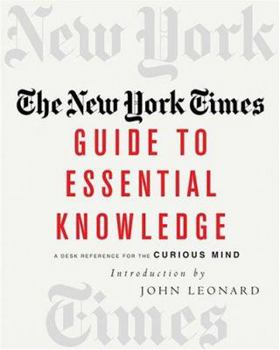The New York Times Guide to Essential Knowledge: A Desk Reference for the Curious Mind
"The new standard in reference from the nation's leading newspaper: ""A thorough, authoritative, easy-to-use guide offering deeper coverage on a broad range of essential subjects." Whether you are... This description may be from another edition of this product.
Format:Hardcover
Language:English
ISBN:0312313675
ISBN13:9780312313678
Release Date:November 2004
Publisher:St. Martin's Press
Length:1104 Pages
Weight:4.25 lbs.
Dimensions:2.3" x 7.8" x 9.6"
Customer Reviews
5 ratings
Should be on all desks!
Published by Thriftbooks.com User , 17 years ago
This book have become my substitute brain. Not really a lexicon, not really a thriller novel -- though a little bit of both, this book is really something special. It is simply a great work of reference, from the biography-pages that has the basic info on just about anyone, to a list of the most common misspellings in the English language, and the correct way to spell them. But I often find me just flipping to a random page, and learning completely new things about the Mesopotamian empires...
Great organization
Published by Thriftbooks.com User , 18 years ago
For those who said this book doesn't have anything you couldn't find in your local library. Well, duh. This book doesn't have anything you couldn't find in the library, or faster yet, online. The entire point is the organization, having everything at hand in a concise manner. You'd have to do some searching and clicking to get all the information about one subject that this book stuffs into a few pages, and you wouldn't get them in concise, logical order without repetition. Obviously, this book doesn't go ultra in depth or cover every subject area. Even whole encyclopedia sets can't do that. The best part of the book, in my opinion, is it tells you what you need to know. If you want to be fairly knowledgeable in any given subject really quickly, its useful to not have to read a lot of books/internet sources and then figure out what part of the information you can/should retain.
Informative and readable
Published by Thriftbooks.com User , 18 years ago
The Internet has pushed collections like this towards irrelevance, but this book's clear organization and attractive design make it a welcome resource. The text is organized into about 30 main topics (e.g. 'History') and each main topic is composed of several subtopics ('World History', 'Major Wars in History' and 'History of the Unites States'). These main topics and subtopics appear at the top of every page and provide high accessibility. The book also contains a biographical dictionary and almanac-like lists and tables. Makes a great gift (my sister gave it to me).
A Lot of Information, Easy to Finc
Published by Thriftbooks.com User , 19 years ago
A Desk Reference for the Curious Mind -- General, Reference, Trivia, Reference / General ==I started off with this book by having a question: What is the capital of Uruguay. ==After all, a Guide to Essential Knowledge should contain such facts. Further they should be easy to find (well indexed), the page referenced should be easy to find, and the information on the page should be easy to distinguish from the rest of the page. ==Well I turned to the index, yup, there was Uruguay - page 857. 'Turned to page 857, this was in the section Nations of the World, Uruguay was in bold face type and underlined in the middle of the left hand column. A couple of inches from the top of the Uruguay entry it said, Capital: Montevideo. The book certainly passed the first test. ==Then I started flipping through the book. I found the Hundred Words Most Frequently Misspelled - I won't bother to mention how many of these I frequently mizzpel. ==As with any of these omnibus type books, the selection of what material to include is always a problem. You can't put in everything and still be able to lift it. So far, everything I've looked for I've found, what more can I add.
Packed with useful info and well written too!
Published by Thriftbooks.com User , 19 years ago
Bluffers beware: owners of this well-written, surprisingly entertaining tome (1096 pages, a bit over 4 pounds) are likely to settle any fact-based argument on the spot. Whether the argument concerns what year K.C. Jones was inducted into the Basketball Hall of Fame, or who the great figures of Iraqi mythology might be, or what famous people originally hailed from New Hampshire, a dip into these pages will prove you right or wrong. There are three main sections: The Arts; Economics, Business and Finance; and Science and Technology. Each chapter (Dance, Geography, Mathematics, Literature and Drama, Medicine, Sports, etc) starts off with a succinct but comprehensive history. For example, "Architecture" moves from the Paleolithic to Skyscrapers in 11 pages, managing to define Byzantine and list the great works of Frank Lloyd Wright without skipping the Baroque. Each chapter highlights the famous people in its field and concludes with a glossary of terms. "Times" writers have contributed essays throughout, including Steve Kinzer on Jelly Roll Morton, Jane Brody on Hypertension, and Nicholas Wade on the future of human evolution. The back of the book is a treasure trove of facts: a language usage guide, a crossword puzzle dictionary, vital statistics of the world's nations and the U.S. states, a list of award-winners, a dictionary of food, a wine primer, a guide to nutrition, and a biographical dictionary of 1,000 people. This is one of those books you didn't know you needed till you had it.





